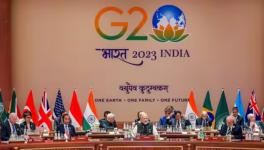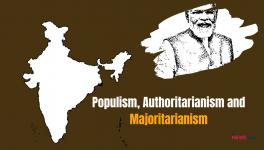Babri Case: Here’s Why Secularism is Not Just for Minorities
The constitutionality and legality of the judgment on Ayodhya can be discussed endlessly, but what really matters is the silent majoritarianism that has been manufactured by the RSS-BJP combine across the nation. This is one reason why it was understood—almost a given—that this time around the Babri mosque issue would not lead to any violence on the streets.
The way the Muslims of India have preferred to ‘reconcile’ or just let the matter be, and trade-off their identity for their physical safety, is the real “victory”, of a vicious kind. Having once pushed through the majoritarian will, the Rashtriya Swayamsevak Sangh can now afford to appear accommodating, even compassionate.
As usual, Prime Minister Narendra Modi is waxing eloquent about the importance of maintaining peace and accepting the verdict of the Supreme Court. (Announced on Saturday, the verdict denied the Sunni Waqf Board’s claim on the disputed property in Ayodhya.) The credibility of such statements rests almost exclusively on the Bharatiya Janata Party-RSS combine demonstrating their willingness to accept the court’s decision. The statement is credible only if the RSS and its factions remain peaceful even if the verdict had gone against the majority Hindu community.
It is ironical that silence and peace are the new registers in which majoritarianism is being flaunted.
RSS chief Mohan Bhagwat has signaled that no Muslim structure should come within the radius of Hindu cultural space in Ayodhya; while All India Majlis-e-Ittehadul Musilmeen chief Asaduddin Owaisi has expressed his displeasure at the Muslims being awarded five acres land in lieu of the Babri mosque. This award came despite the court acknowledging that the demolition of the mosque was illegal and did not befit a secular-constitutional democracy. The court’s judgment, all said, reeks of helplessness in the face of a bulging majoritarian consent.
There can be little doubt that a majority of Hindus are celebrating and welcoming the decision. RSS has perfected the art of manufacturing consent and taking subtle care of various emotions that accompany a moment such as this. It issues veiled threats, calls to maintain peace and harmony, expresses the need that others should follow the law and then also to assert ones’ identity. These statements and allusions occupy all the space available around an issue, including the Ayodhya verdict. In this way the RSS caters to the militant and the moderate alike. It caters to jubilation and guilt, if any, for they are building majoritarianism without the burden of conscience.
Many factors have come together in this kind of brazen majoritarianism. The neoliberal economic model has robbed the Hindu majority of an assured life and social security. Added to this is the Modi-Shah [home minister Amit Shah] duo, who have no social capital or credibility other than their ability to be abrasive and unmindful of the consequences of their actions.
Their leadership has not evolved organically over a period of time but erupted after the Gujarat riots of 2002. No other regional leaders have, in such a short time span, became national leaders. After all, they deliver electoral wins and continue to pursue the agenda set by the RSS. This compulsive logic, inherent to Modi and Shah’s leadership, has augmented the agenda set by the RSS, and they are moving India closer to the dystopia of Hindu rashtra.
Further, it needs to acknowledged that in the current political scenario, the Hindu rashtra narrative is the only concrete imagination that is on the horizon. For this there are milestones and end-goals clearly laid out. After the National Register of Citizens or NRC was implemented in Assam, and the abrogation of Article 370 in Jammu and Kashmir, the focus moved to building the mandir in Ayodhya. This is to be followed by implementation of the Uniform Civil Code or UCC, the disenfranchisement of Muslims, erasure of all public symbols of Muslim rule in the past. And, if needed, to officially declare India a theocratic state.
The steps and the goal are clear. The majority’s consent and commitment have to be maintained through hyper-nationalism, propelling people into a constant sense of fear, raising internal security issues and undermining the “liberal elites”. The RSS and BJP, so far, have managed to fructify their goals with uncanny precision.
The Congress party is only playing softball, waiting to inherit the existing regime as it is. Meanwhile, the regional forces and the Left espouse constitutional language, which is important, but they will only be able to stall triumphant majoritarianism after building consent among the people for their style of politics. The only possible way out of majoritarianism is to depict the possible injustice in colonising a population or community different from oneself, and how such a monolithic order would hurt the interests of majority Hindus, given the huge diversity that underlies this constructed majoritarian identity. The Opposition needs to build a robust narrative about why justice to the religious minorities also ensures justice to the majority and the links between the two.
For instance, the economy is doing badly but the Modi government is unable to bring it back on track because of the political psyche of majoritarianism, which boosts people’s self-image without allowing them to participate as fuller citizens. It is ironical, but the majority gets disempowered in the construction of majoritarianism. For, the fear that grips the minorities also needs to be perpetually constructed for the majority. A breakdown of trust is at the heart of hyper-nationalism and the poor performance of the economy.
How can we translate these intricate relations into simple and popular narratives is the most urgent challenge to be addressed?
The question that will take some time to settle is whether or not the majority Hindus will tire of whipping the minorities. Similarly, we need also to ask what is it that the Muslims can do to offset the popular myths being built about them by the Hindu right. How can they strive for an alternative narrative of a community that is neither violent nor disrespectful to other religions? It is important that we find collective means for majority Hindus to see the unfairness of what majoritarianism does to the minorities but also to society as a whole.
The author is associate professor, Centre for Political Studies, Jawaharlal Nehru University.
Get the latest reports & analysis with people's perspective on Protests, movements & deep analytical videos, discussions of the current affairs in your Telegram app. Subscribe to NewsClick's Telegram channel & get Real-Time updates on stories, as they get published on our website.
























